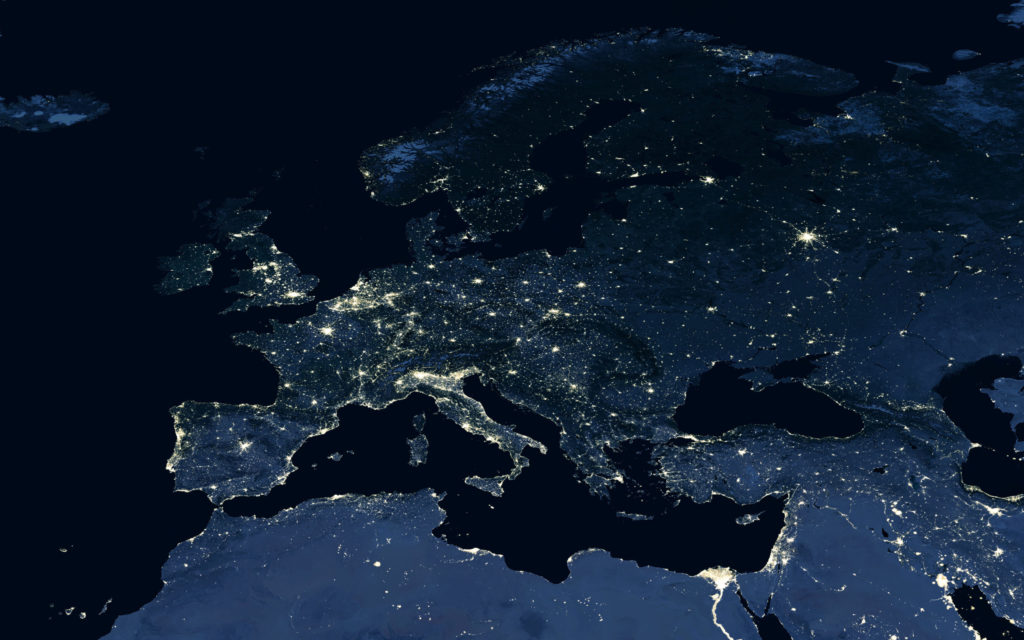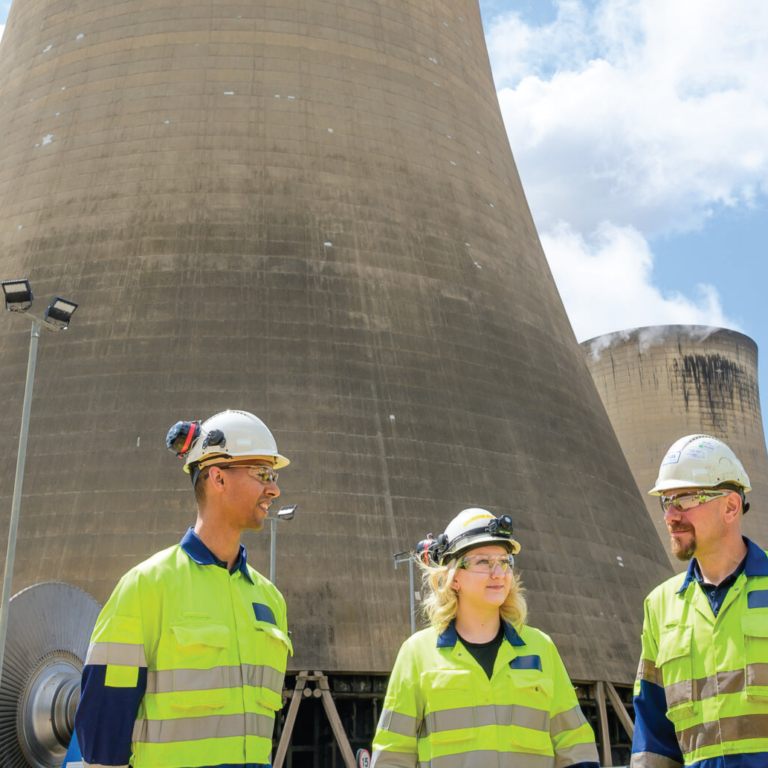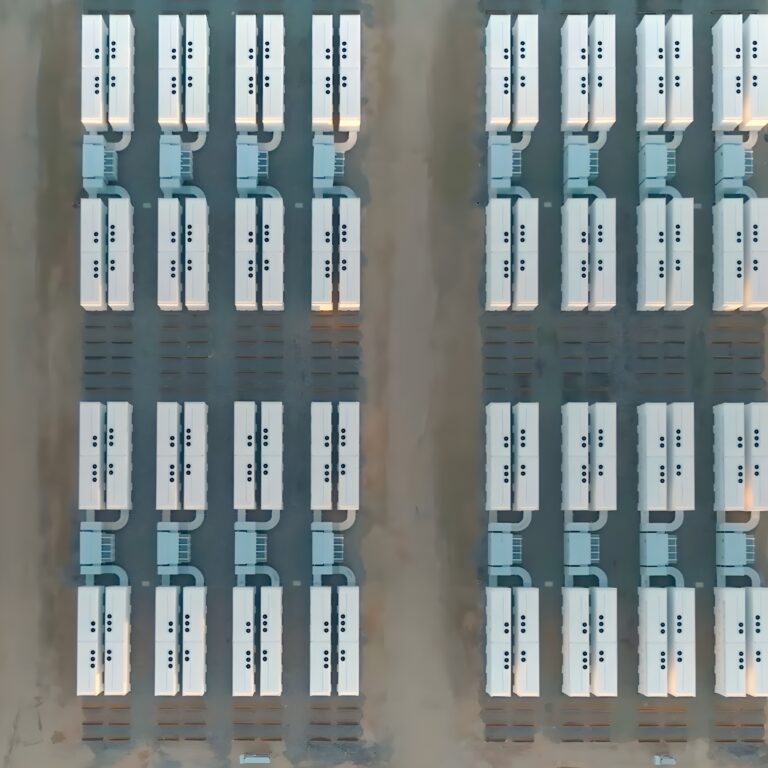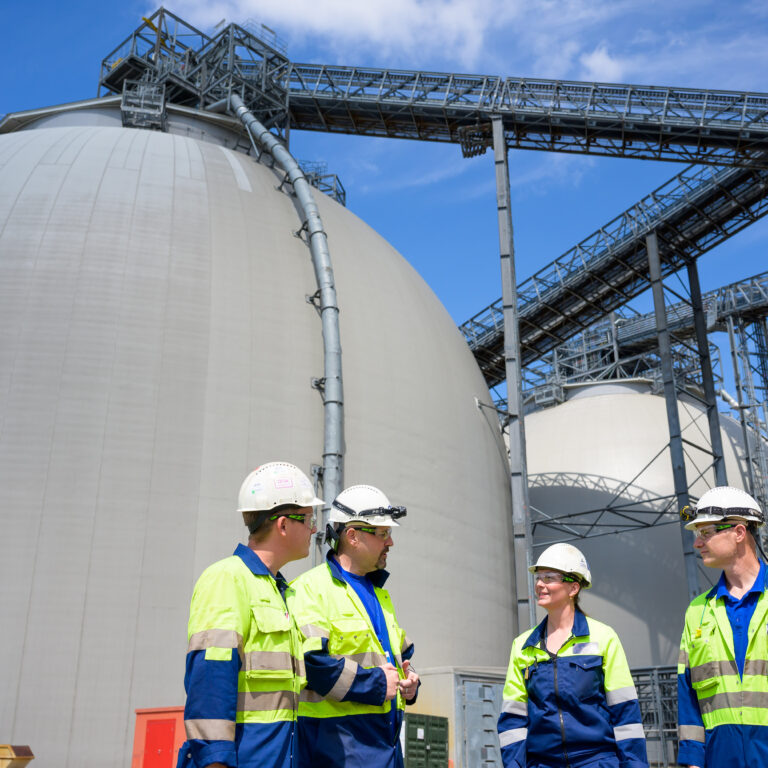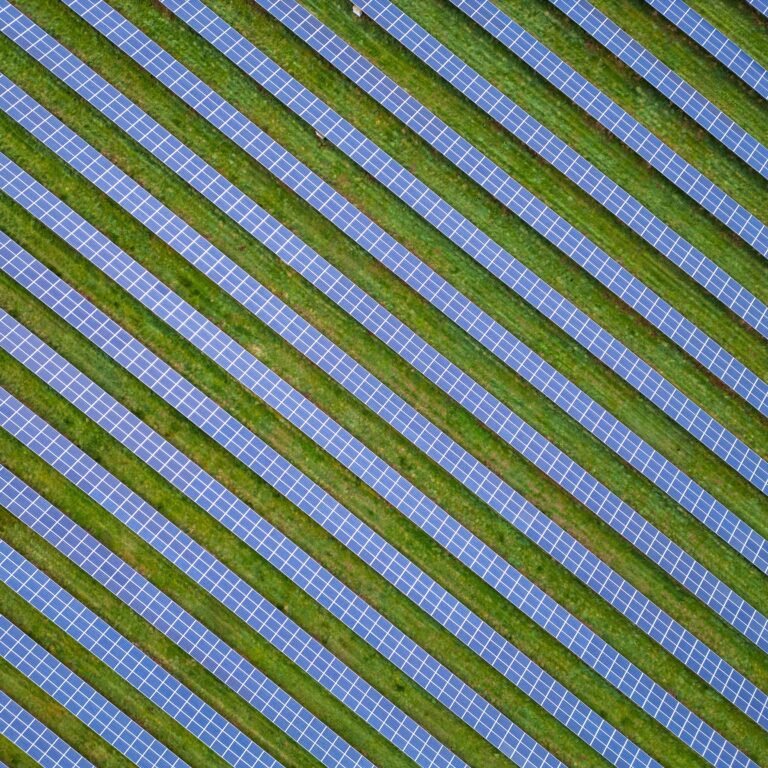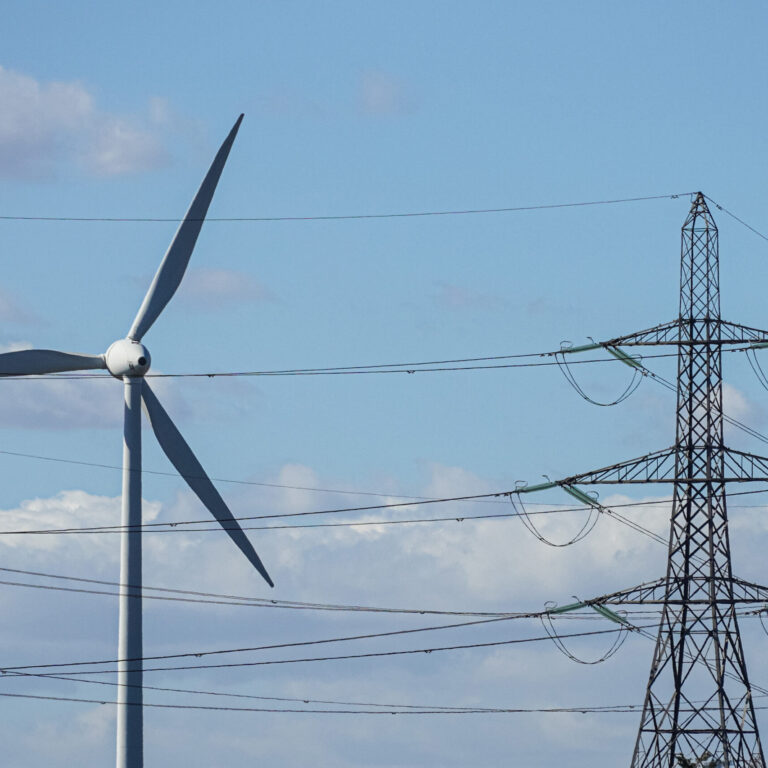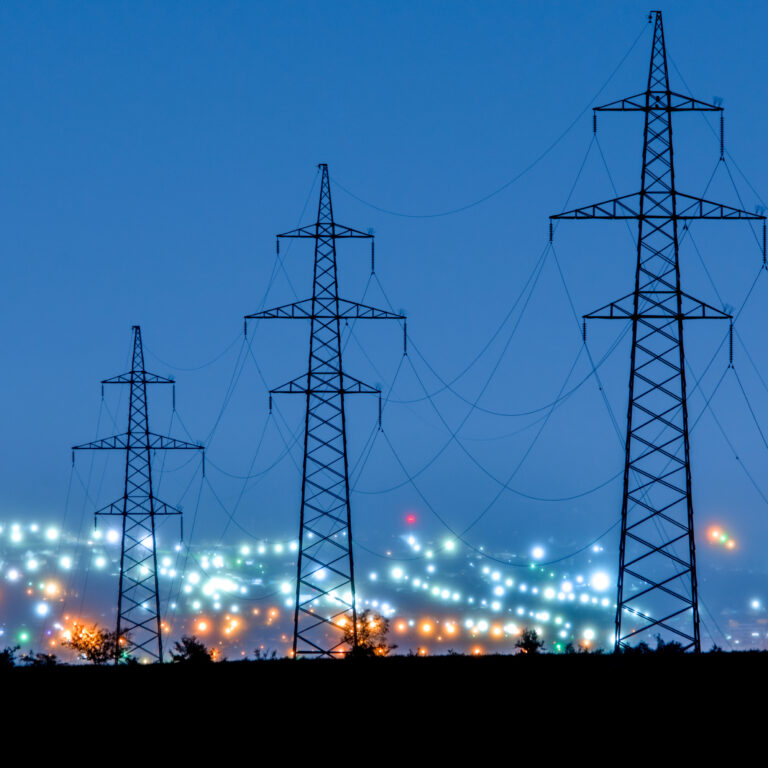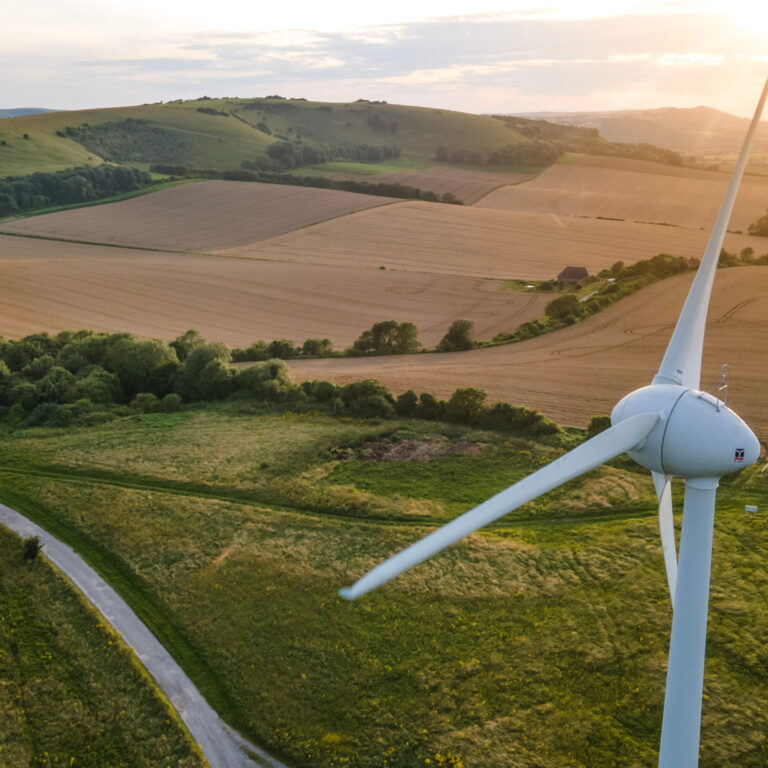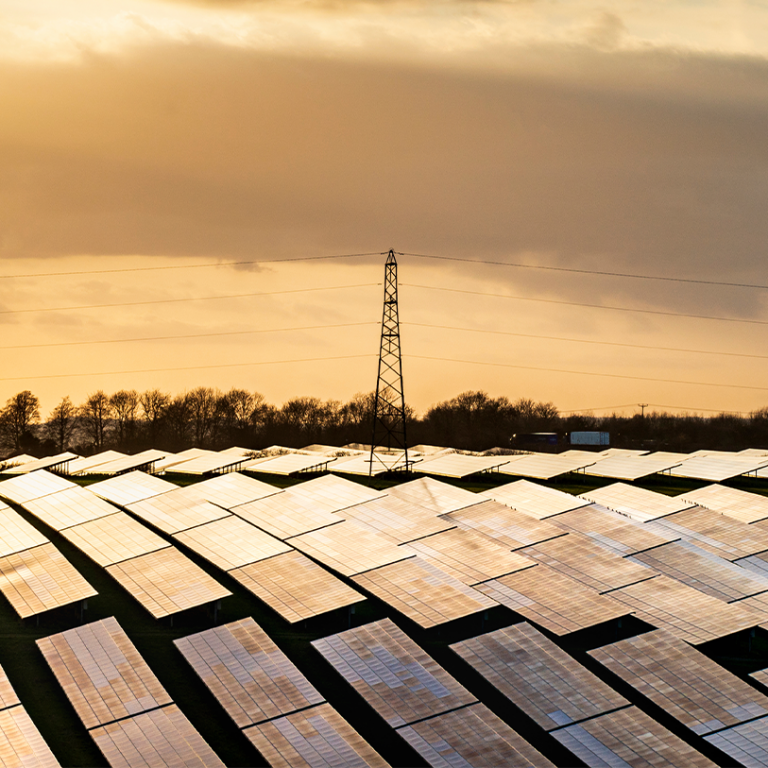- European countries such as Germany are leading the way in slashing their demand for gas, according to Drax Electric Insights.
- The UK is showing no signs of changing its gas consumption levels, with an exceptionally mild autumn leading to its modest reductions year-on-year.
- Households could save up to £200 by turning down their thermostat by just 1°C, and save the government £3bn in funding the Energy Price Guarantee.
The independent analysis by academics from Imperial College London for Drax Electric Insights, commissioned via Imperial Consultants, shows that the UK’s gas reduction year-on-year was outpaced by Germany, France, Italy, and Spain – with demand for gas actually rising in Britain in September compared to previous years.
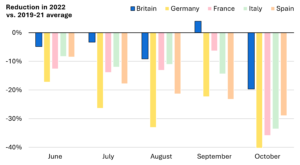
Change in natural gas consumption versus the previous three years in UK and comparable European countries. Data covers all sectors excluding power generation and are not adjusted for weather differences.
What reduction there was in gas use in the UK was attributable to unseasonably warm weather rather than people adjusting their behaviour. The analysis for Drax Electric Insights showed that from September, through to end of November, Britain’s gas demand was just 0.3% lower than would have been expected pre-energy crisis, when accounting for weather anomalies.
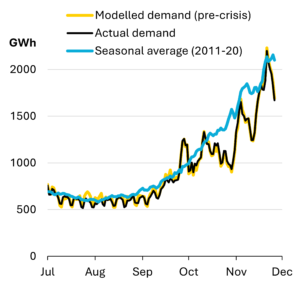
Daily natural gas consumption in UK versus expectations. The blue line shows the seasonal average for all end users except power generation over 10 years to 2020. The yellow line adjusts for weather, showing what demand would be with pre-crisis behaviour. The black line shows actual consumption.
Dr Iain Staffell of Imperial College London, and lead author of the quarterly Drax Electric Insights report, said:
“The UK is an outlier on the world stage, showing no signs of reducing its appetite for gas during a time of dramatically higher prices.
“If temperatures continue to drop during the festive season, managing the energy crisis will be both more difficult and expensive unless people and businesses break their addiction to gas. Turning the thermostat down by just 1°C would save households up to £200 a year on their energy bills and save the UK from importing 50TWh of natural gas over the winter – cutting the cost of the government’s Energy Price Guarantee by £3bn.”
On the continent, national governments have introduced demand reduction measures alongside information campaigns to inspire the public and businesses to act. In Germany, public buildings have turned down their thermostats to 19°C and outside illuminated advertising must be turned off between 10pm until 6am.
The UK Government has now launched a public information campaign on how people can claim financial support this winter alongside more technical advice on how to reduce energy use while still keeping warm, such as reconfiguring boiler settings. This followed the Chancellor announcing a further £6bn to insulate homes and upgrade boilers.
Penny Small, Drax’s Group Generation Director, said:
“As a result of Russia’s war in Ukraine the UK’s energy system is under considerable strain this winter and the combination of rising inflation and gas prices has put most household budgets under pressure.
“Britain’s long-term energy security will be strengthened by ending our reliance on expensive imported fossil fuels such as gas and instead increasing investment in homegrown renewables, and innovative green technologies such as bioenergy with carbon capture and storage (BECCS) and pumped storage hydro.”
Drax is the UK’s biggest renewable power producer by output, generating enough renewable electricity from biomass and hydro for around 5 million homes.
It plans to invest billions of pounds expanding its pumped hydro storage capacity at its Cruachan power station in Scotland and also deploying BECCS at its power station in North Yorkshire, to permanently remove 8million tonnes of carbon dioxide from the atmosphere each year by 2030.
ENDS
Media contacts:
Aidan Kerr
Media Manager
E: [email protected]
T: 07849090368
Ali Lewis
Head of Media & PR
E: [email protected]
T: 07712 670 888
Editor’s Notes
A copy of the Drax Electric Insights Q3 2022 report is available by clicking here.
- Records broken during Q3 2022 include power exports reaching an all-time instantaneous percentage high of total generation – 20.9%.
- Warm weather was central to gas demand reduction in the UK, with October 3°C warmer the average with a record-breaking 30°C recorded on a single-day in Gravesend.
- In November, during the first three weeks just one day in the month was colder than average.
- Britain’s gas demand is heavily linked to weather, with an additional 160 GWh for every degree that it falls below 15°C.
- Average household savings by reducing thermostats by 1°C during the winter period (October to March) would save consumers £1-£1.50 per day.
- As well as saving the country money, reducing gas demand by 50 TWh would cut carbon emissions by 10.2 million tonnes – or 3% of the UK’s total CO2
About Electric Insights
- Electric Insights is commissioned by Drax and delivered by a team of independent academics from Imperial College London, facilitated by the college’s consultancy company – Imperial Consultants. The quarterly report analyses raw data made publicly available by National Grid and Elexon, which run the electricity and balancing market respectively, and Sheffield Solar.
- Electric Insights Quarterly focuses on supply and demand, prices, emissions, the performance of the various generation technologies and the network that connects them.
- The quarterly reports from the last four and a half years can be access at the new website electricinsights.co.uk alongside the interactive electricinsights.co.uk which provides data from 2009 until the present.
- You can embed Electric Insight’s live dashboard on your website or blog to keep track of what’s happening in the power grid through a new widget.
About Drax
Drax Group’s purpose is to enable a zero carbon, lower cost energy future and in 2019 announced a world-leading ambition to be carbon negative by 2030, using bioenergy with carbon capture and storage (BECCS) technology.
Drax’s around 3,000 employees operate across three principal areas of activity – electricity generation, electricity sales to business customers and compressed wood pellet production and supply to third parties. For more information visit www.drax.com
Power generation:
Drax owns and operates a portfolio of renewable electricity generation assets in England and Scotland. The assets include the UK’s largest power station, based at Selby, North Yorkshire, which supplies five percent of the country’s electricity needs.
Having converted Drax Power Station to use sustainable biomass instead of coal it has become the UK’s biggest renewable power generator and the largest decarbonisation project in Europe. It is also where Drax is piloting the groundbreaking negative emissions technology BECCS within its CCUS (Carbon Capture Utilisation and Storage) Incubation Area.
Its pumped storage, hydro and energy from waste assets in Scotland include Cruachan Power Station – a flexible pumped storage facility within the hollowed-out mountain Ben Cruachan.
The Group also aims to build on its BECCS innovation at Drax Power Station with a target to deliver 4 million tonnes of negative CO2 emissions each year from new-build BECCS outside of the UK by 2030 and is currently developing models for North American and European markets.
Pellet production and supply:
The Group has 18 operational pellet plants and developments with nameplate production capacity of around 5 million tonnes a year.
Drax is targeting 8 million tonnes of production capacity by 2030, which will require the development of over 3 million tonnes of new biomass pellet production capacity. The pellets are produced using materials sourced from sustainably managed working forests and are supplied to third party customers in Europe and Asia for the generation of renewable power.
Drax’s pellet plants supply biomass used at its own power station in North Yorkshire, England to generate flexible, renewable power for the UK’s homes and businesses, and also to customers in Europe and Asia.
Customers:
Drax supplies renewable electricity to UK businesses, offering a range of energy-related services including energy optimisation, as well as electric vehicle strategy and management.
To find out more go to the website www.energy.drax.com







